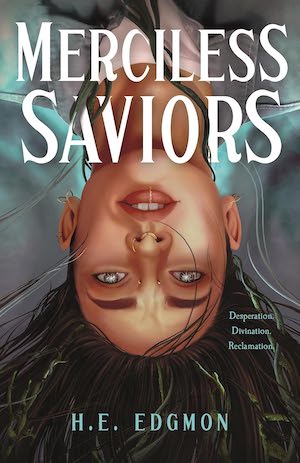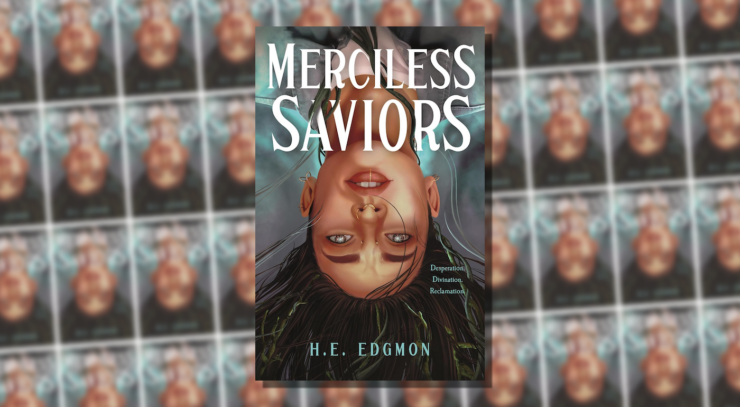Merciless Saviors, the conclusion to H.E. Edgmon’s contemporary YA fantasy duology, picks up right where Godly Heathens left off: in the aftermath of the fight in the church. By the time Gem gets it together, alliances have shifted. Some want Gem dead, some want to return to the Ether, some want to remain on Earth, and some just want to survive no matter what. No matter what each god wants, first they have to contend with the ramifications of Gem’s violence in the first book, namely that all their powers are spiraling out of control. If Gem offers mercy, it could cost them and the people they love everything. If they give into their merciless side, it could destroy both Earth and the Ether. What’s a teenage god to do?
Edgmon upped his game in this novel. The story is still written largely in first person present tense from Gem’s point of view. However, this time we also get scenes written in third person present from Rory and Enzo’s POVs, as well as unusual narrative styles that feel almost like a novel-in-verse. The latter sections occur during dreams or deaths, transferring the characters’ disjointed, discombobulated experiences onto the reader. It’s a really fun way to read.
In the first book, we got hints of sexual abuse happening to a couple of the characters. I won’t spoil who or what happens, but that subtext becomes actual text in Merciless Saviors. The title of the novel is literal, not metaphorical. When those characters finally face their abusers, they do so without mercy or pity. But they also have to confront the way they have processed—or refused to process—the trauma created by that abuse. Abuse doesn’t just impact the person being harmed; it ripples out into entire communities and social groups. It can spread across generations. It can drive abuse survivors into abusing others or themselves. This is not a cut and dry issue but something terribly complex. Edgmon doesn’t shy away from any of that. He leans into the messiness of it all, giving teens the space to engage with these themes head on without overwhelming them.
Buy the Book


H.E. Edgmon
What I found disappointing (at first) was how the gods treated their humans and each other. Edgmon spends a lot of time emphasizing the Indigeneity of Gem, Rory, and Enzo, something I found incredibly compelling and refreshing. When they return to the Ether as gods, all that falls away. They behave more like Western gods than deities with Indigenous roots. These are like the gods of ancient Greece and Rome but even more power-drunk and overbearing. Everything Indigenous about Gem vanishes when they return to the Ether. It’s silly to complain that gods don’t show any humanity, but I didn’t love switching from Indigenous teens to every tired god trope from Western fantasy fiction. This has been a series that has pushed back on or broken Western tropes, except this one time. And then Edgmon reminded me why I admire him so much as an author.
There’s a moment where the Mountain and the Shade talk about the land and their godly connection to it: Shade was supposed to see the land as a sacred gift rather than a resource to be exploited. That moment of reckoning cracks open the Western fantasy tropes Edgmon had been relying on. It’s actually not that Gem lost their Indigenous connections but that they were actively trying to suppress it. They went from the oppressed to the oppressor, so of course it makes sense that they would mimic the oppressors of Earth. When confronted with this realization, that mimicry falls away. Whatever kind of gods they were before they left the Ether, now they’re three queer Indigenous trans teens trying to fix mistakes made too long ago by beings with no regard for the land or anything living on it.
Their experiences now mirror what many Native people have had in a post American Indigenous Movement world. Their connection to the Ether and its nature has been forcibly, violently severed, but that doesn’t mean it can’t be repaired. It won’t be like it was—too much has been lost—but they can carry the old traditions into this new world. It’s also reflective of what it’s like to be multiracial between a colonizer and the colonized. Gem, Rory, and Enzo must grapple with what the past versions of themselves did to the land and their people while also grappling with the intergenerational trauma of that violence. They are both responsible for and victims of imperialistic violence. So how do you take those dual experiences, the abused and the abuser, and use it to reclaim a history that has largely been lost and forge it into something both new and traditional? There is no easy answer here, but they’ll have to figure it out eventually. It takes real skill as a writer to handle that bait and switch so deftly. Truly impressive.
Actually, “truly impressive” could be my blurb for the entire The Ouroboros duology. At every turn, Edgmon defied expectations. It was less an act of twisting a trope than of completely redefining it. Many teens are (unfortunately) going to resonate with its themes of surviving sexual abuse. This book is for them. I hope it will be an anchor to help them stop their trauma from overtaking them and a ladder to help them climb out of it. Or, at the very least, a mirror to see how other young adults engage with surviving. Maybe they can find enough in this series to seek help. A vital, important conclusion to a riotous series.
Merciless Saviors is published by Wednesday Books.










